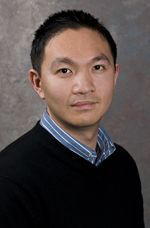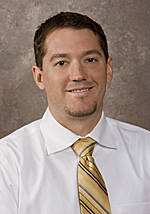

ADVERTISEMENT
- Rozovsky wins prestigious NSF Early Career Award
- UD students meet alumni, experience 'closing bell' at NYSE
- Newark Police seek assistance in identifying suspects in robbery
- Rivlin says bipartisan budget action, stronger budget rules key to reversing debt
- Stink bugs shouldn't pose problem until late summer
- Gao to honor Placido Domingo in Washington performance
- Adopt-A-Highway project keeps Lewes road clean
- WVUD's Radiothon fundraiser runs April 1-10
- W.D. Snodgrass Symposium to honor Pulitzer winner
- New guide helps cancer patients manage symptoms
- UD in the News, March 25, 2011
- For the Record, March 25, 2011
- Public opinion expert discusses world views of U.S. in Global Agenda series
- Congressional delegation, dean laud Center for Community Research and Service program
- Center for Political Communication sets symposium on politics, entertainment
- Students work to raise funds, awareness of domestic violence
- Equestrian team wins regional championship in Western riding
- Markell, Harker stress importance of agriculture to Delaware's economy
- Carol A. Ammon MBA Case Competition winners announced
- Prof presents blood-clotting studies at Gordon Research Conference
- Sexual Assault Awareness Month events, programs announced
- Stay connected with Sea Grant, CEOE e-newsletter
- A message to UD regarding the tragedy in Japan
- More News >>
- March 31-May 14: REP stages Neil Simon's 'The Good Doctor'
- April 2: Newark plans annual 'wine and dine'
- April 5: Expert perspective on U.S. health care
- April 5: Comedian Ace Guillen to visit Scrounge
- April 6, May 4: School of Nursing sponsors research lecture series
- April 6-May 4: Confucius Institute presents Chinese Film Series on Wednesdays
- April 6: IPCC's Pachauri to discuss sustainable development in DENIN Dialogue Series
- April 7: 'WVUDstock' radiothon concert announced
- April 8: English Language Institute presents 'Arts in Translation'
- April 9: Green and Healthy Living Expo planned at The Bob
- April 9: Center for Political Communication to host Onion editor
- April 10: Alumni Easter Egg-stravaganza planned
- April 11: CDS session to focus on visual assistive technologies
- April 12: T.J. Stiles to speak at UDLA annual dinner
- April 15, 16: Annual UD push lawnmower tune-up scheduled
- April 15, 16: Master Players series presents iMusic 4, China Magpie
- April 15, 16: Delaware Symphony, UD chorus to perform Mahler work
- April 18: Former NFL Coach Bill Cowher featured in UD Speaks
- April 21-24: Sesame Street Live brings Elmo and friends to The Bob
- April 30: Save the date for Ag Day 2011 at UD
- April 30: Symposium to consider 'Frontiers at the Chemistry-Biology Interface'
- April 30-May 1: Relay for Life set at Delaware Field House
- May 4: Delaware Membrane Protein Symposium announced
- May 5: Northwestern University's Leon Keer to deliver Kerr lecture
- May 7: Women's volleyball team to host second annual Spring Fling
- Through May 3: SPPA announces speakers for 10th annual lecture series
- Through May 4: Global Agenda sees U.S. through others' eyes; World Bank president to speak
- Through May 4: 'Research on Race, Ethnicity, Culture' topic of series
- Through May 9: Black American Studies announces lecture series
- Through May 11: 'Challenges in Jewish Culture' lecture series announced
- Through May 11: Area Studies research featured in speaker series
- Through June 5: 'Andy Warhol: Behind the Camera' on view in Old College Gallery
- Through July 15: 'Bodyscapes' on view at Mechanical Hall Gallery
- More What's Happening >>
- UD calendar >>
- Middle States evaluation team on campus April 5
- Phipps named HR Liaison of the Quarter
- Senior wins iPad for participating in assessment study
- April 19: Procurement Services schedules information sessions
- UD Bookstore announces spring break hours
- HealthyU Wellness Program encourages employees to 'Step into Spring'
- April 8-29: Faculty roundtable series considers student engagement
- GRE is changing; learn more at April 15 info session
- April 30: UD Evening with Blue Rocks set for employees
- Morris Library to be open 24/7 during final exams
- More Campus FYI >>
10:41 a.m., Oct. 30, 2009----Two young faculty members at the University of Delaware are among 37 scientists and engineers nationwide selected to receive grants totaling more than $650,000 over three years through the Air Force's Young Investigator Research Program (YIP). The program is open to scientists and engineers at research institutions across the United States who have received Ph.D. or equivalent degrees in the last five years and show exceptional ability and promise for conducting basic research.
Jingyi Yu, assistant professor in the Department of Computer and Information Sciences, will carry out research to develop a new hybrid camera array for tracking and reconstruction under low light. Earlier this year, Yu received a National Science Foundation Faculty Early Career Development Award to study multi-perspective imaging, rendering, and projection -- techniques that have the potential to dramatically change how images are captured, delivered and viewed by the human eye.
David Burris, assistant professor in the Department of Mechanical Engineering, plans to conduct research focusing on linking tribofilm nanomechanics to the origins of low friction and wear. Tribology, Burris's area of expertise, is the science and technology of such phenomena as friction, wear, and lubrication.
“This is a very prestigious award,” says Anette Karlsson, chairperson of the Department of Mechanical Engineering, “and the department is lucky to have such an outstanding young faculty member as David. I am also very pleased to note that this is the second year in a row the department has a faculty member receiving this award.” Erik Thostenson, assistant professor, received the award last year.
It is also the second year in a row that UD has had two winners. Thomas H. Epps, III, assistant professor in the Department of Chemical Engineering, also received an AFOSR YIP award last year.
“UD was one of only seven schools to have multiple winners this year,” says Michael Chajes, dean of the College of Engineering. “We were in good company, with the others being Carnegie Mellon University, Northwestern, California Institute of Technology, University of Texas at Austin, Florida State University, and University of California Berkeley.”
Douglas Doren, associate dean of the College of Arts and Sciences, said of Yu's award, "This award is a significant new honor for Jingyi, and a great example of UD's prominence in computer science research."
“Jingyi Yu is doing amazing things with cameras and displays,” David Saunders, chairperson of the Department of Computer and Information Sciences, said. “This award is important recognition, along with his NSF CAREER Award. Most importantly, this funding enables a project to go forward that is revolutionizing what can be done with camera systems. Professor Yu is a tremendous asset to the Department of Computer and Information Sciences and to UD.”
Yu joined the University of Delaware faculty in 2005 after earning his doctorate at the Massachusetts Institute of Technology. In 2007, he won a UD Exemplary Use of Technology in Teaching Award for using emerging interactive technologies such as TabletPCs and Wiimotes in his computer graphics course (CISC 440/640).
Burris earned his Ph.D. at the University of Florida, an institution widely recognized as a leader in the area of tribology and interfacial sciences. Shortly after joining the UD faculty in September 2008, he was selected to receive the Marshall B. Peterson Award from the American Society of Mechanical Engineers (ASME). The award is given biennially in recognition of early-career achievements and promise for pursuit of research in tribology.
The objective of the YIP program is to foster creative basic research in science and engineering, enhance early career development of outstanding young investigators, and increase opportunities for the young investigators to recognize the Air Force mission and the related challenges in science and engineering. The agency invested more than $14 million in the 2010 program.
Article by Diane Kukich


